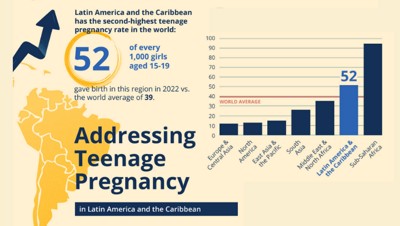- OVERVIEW
- SPEAKERS
- RELATED
This webinar, co-organized with the Development Impact (DIME) Department, in the World Bank Research Group, is part of the Insights In Advancing Gender Equality webinar series, from the Latin America and the Caribbean Gender Innovation Lab (LACGIL), which focuses on lessons learned and practical solutions designed by gender specialists, development practitioners (inside and outside the World Bank Group), and non-governmental organizations to address gender inequalities in Latin America and the Caribbean (LAC).
The objective of this LACGIL webinar is to inform of the latest innovative interventions to reduce teenage pregnancy in the region, such as an innovative peer-led intervention in Brazil.
This webinar provides an opportunity to establish a conversation with key actors in the region about what is working to address this important issue and collaborate in the generation of evidence through impact evaluations and inferential studies on teenage pregnancy and aspirations.
 780x439LAC - InfTeenagePregnancyLACKeyFrame
780x439LAC - InfTeenagePregnancyLACKeyFrame
Addressing Teenage Pregnancy in Latin America and the Caribbean
Latin America and the Caribbean has the second-highest teenage pregnancy rate in the world: 52 of every 1,000 girls aged 15-19 gave birth in this region in 2022 vs. the world average of 39.
Date: March 27, 2025
Time: 09:00 AM - 10:00 AM ET
Location: Online





